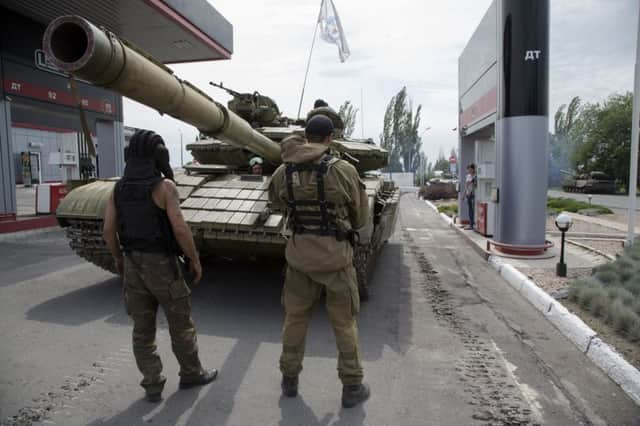‘Nato has been too complacent on Russia’


In a hard-hitting report – the first since Conservative MP Rory Stewart took over as chairman – the defence select committee said the annexation of Crimea and support of rebels in eastern Ukraine by Vladimir Putin’s Russia was “a wake-up call”, and that the UK was under-prepared to deal with such a threat. It follows the shooting down of Malaysia Airlines Flight MH17, with the loss of 298 lives, by what the West says were Russian-backed rebels in eastern Ukraine. The report also came as the United Nations asked the two sides to cease fighting in eastern Ukraine to allow investigators to examine the crash site.
Despite international condemnation, rebels yesterday again prevented investigators reaching the wreckage.
Advertisement
Hide AdAdvertisement
Hide AdThe attacks on Ukraine’s territory by Russian-backed rebels have led to concerns Nato members in former Soviet republics such as Lithuania, Latvia and Estonia could be under threat.
In its report, the committee also said more large-scale military exercises need to take place in the region.
Labour has called for Prime Minister David Cameron to use a Nato conference in Wales in September to reinforce Nato’s position as a military power, as one leading defence analyst said Britain may need more tanks, fighter jets and other hardware to respond to the threat.
The British Army is undergoing a 20 per cent reduction in regular troop numbers, from 102,000 in 2010 to 82,000 in 2020. Britain is also winding up its bases in Germany after almost 70 years.
MPs also called for improvements to Nato’s rapid response capabilities and a new standing reserve force. And they stated the UK needs to upgrade its Russian expertise again, after a period in which the priority was other threats elsewhere.
Mr Stewart, a Hong Kong-born former Black Watch officer raised in Scotland, said: “The risk of attack by Russia on a Nato member state, whilst still small,, is significant.
“We are not convinced that Nato is ready for this threat.
“Nato has been too complacent about the threat from Russia, and it is not well prepared.”
Mr Stewart, who served in Iraq, added: “Even worse, the nature of Russian tactics is changing fast – including cyber attacks, information warfare and the backing of irregular ‘separatist groups’, combining armed civilians with Russian special forces operating without insignia.
Advertisement
Hide AdAdvertisement
Hide Ad“We have already seen how these tactics have been deployed by Russia and its proxies in Ukraine to destabilise a Nato partner state, annex part of its territory, and paralyse its ability to respond.”
Defence analyst Tim Ripley said the committee correctly identified that the last strategic defence and security review – which recommended troop reductions and said the UK would never again face a conventional threat – was entirely wrong.
He said: “Events of this summer have shown it is a dead premise and now the government is desperately playing catch-up. All the UK’s focus has been on Afghanistan and dealing with counter-insurgency and humanitarian efforts [there] and the Middle East, to the detriment of our European allies.”
He said the UK was only now heeding warnings from the Baltic states. “[They] have been concerned over the threat from Russia since the Georgian crisis six years ago. Now the UK has woken up to the problem but found itself a long way behind.”
The UK, he said, may have to invest in new equipment “such as tanks, fighter jets and so on – which we have been reducing our capabilities in”.
Vernon Coaker, Labour’s shadow defence secretary, said: “As the committee makes clear, the government must demonstrate UK leadership on the international stage at the Wales summit. Recalibrating Nato as a military and political alliance to deter future threats must be a priority for this government, who have failed under David Cameron to think strategically about future UK defence capabilities.”
But the Ministry of Defence insisted it and Nato allies were reacting appropriately to the threat from Russia already. A spokesman said: “As this report recognises, a direct attack by Russia on a Nato state is unlikely, but Russian aggression against Ukraine cannot be ignored.”
The report was published shortly after the Ukrainian army claimed it had seized the key town of Avdiivka near the rebel stronghold of Donetsk, as fighting continued to rage in the east.
Meanwhile, Russia claimed new European Union sanctions were “destructive and short-sighted” and would lead to higher energy prices.